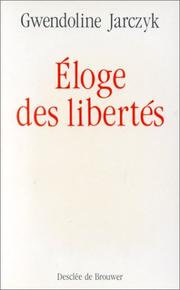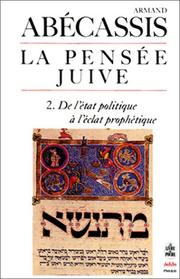
ISBN: 2220031039 9782220031033 Year: 1990 Publisher: Paris: Desclée De Brouwer,
Abstract | Keywords | Export | Availability | Bookmark
 Loading...
Loading...Choose an application
- Reference Manager
- EndNote
- RefWorks (Direct export to RefWorks)
Judaism --- Leibowitz, Yeshayahu --- Strauss, Leo --- Scholem, Gershom Gerhard --- 296*6 --- -Jews --- Religions --- Semites --- Jews --- Joodse theologie en filosofie--(algemeen) --- Religion --- Shṭraʼus, Leʼo --- שטראוס, ליאו --- -Joodse theologie en filosofie--(algemeen) --- -Strauss, Leo --- 296*6 Joodse theologie en filosofie--(algemeen) --- Strauss, Leo. --- Leibowitz, Yeshayahu, --- Judaism - 20th century --- Leibowitz, Yeshayahu, - 1903-1994 --- -296*6 Joodse theologie en filosofie--(algemeen) --- -Strauss, Leo. --- -Leibowitz, Yeshayahu
Book
ISBN: 1555408907 Year: 1993 Volume: 88 Publisher: Atlanta Scholars Press
Abstract | Keywords | Export | Availability | Bookmark
 Loading...
Loading...Choose an application
- Reference Manager
- EndNote
- RefWorks (Direct export to RefWorks)
296*6 --- Judaism --- -Jews --- Religions --- Semites --- Jews --- Joodse theologie en filosofie--(algemeen) --- Doctrines --- Religion --- -Joodse theologie en filosofie--(algemeen) --- 296*6 Joodse theologie en filosofie--(algemeen) --- Jewish theology --- Theology, Jewish --- Talmud --- Talmud Bavli --- Babylonian Talmud --- Talmud, Babylonian --- Talmud Vavilonskiĭ --- Talmoed, Babylonische --- Babylonische Talmoed --- Shas --- Shishah sedarim --- Talmud of Babylonia --- Talmud de Babilonia --- Talmud Babli --- Talmouth --- Talmod --- Criticism, interpretation, etc. --- Theology. --- Theology --- Criticism, interpretation, etc
Book
ISBN: 2207234320 9782207234327 Year: 1987 Publisher: Paris: Denoël,
Abstract | Keywords | Export | Availability | Bookmark
 Loading...
Loading...Choose an application
- Reference Manager
- EndNote
- RefWorks (Direct export to RefWorks)
Jews, French --- Jews, American --- Jews --- Jewish-Arab relations --- Juifs français --- Juifs --- Relations judéo-arabes --- Restoration --- Restauration --- Allen, Woody --- Von Stroheim, Erich, 1885-1957 --- Influence. --- Influence --- 296 <063> --- 296*6 --- #GOSA:XV.Jod.M --- Judaïsme. Jodendom--Congressen --- Joodse theologie en filosofie--(algemeen) --- 296*6 Joodse theologie en filosofie--(algemeen) --- Juifs français --- Relations judéo-arabes
Book
ISBN: 9783110333824 3110333821 9783110339963 9783110395310 3110395312 311033996X 3110553961 Year: 2014 Publisher: Berlin, Germany De Gruyter
Abstract | Keywords | Export | Availability | Bookmark
 Loading...
Loading...Choose an application
- Reference Manager
- EndNote
- RefWorks (Direct export to RefWorks)
Lament, mourning, and the transmissibility of a tradition in the aftermath of destruction are prominent themes in Jewish thought. The corpus of lament literature, building upon and transforming the biblical Book of Lamentations, provides a unique lens for thinking about the relationships between destruction and renewal, mourning and remembrance, loss and redemption, expression and the inexpressible. This anthology features four texts by Gershom Scholem on lament, translated here for the first time into English. The volume also includes original essays by leading scholars, which interpret Scholem's texts and situate them in relation to other Weimar-era Jewish thinkers, including Walter Benjamin, Franz Rosenzweig, Franz Kafka, and Paul Celan, who drew on the textual traditions of lament to respond to the destruction and upheavals of the early twentieth century. Also included are studies on the textual tradition of lament in Judaism, from biblical, rabbinic, and medieval lamentations to contemporary Yemenite women's laments. This collection, unified by its strong thematic focus on lament, shows the fruitfulness of studying contemporary and modern texts alongside the traditional textual sources that informed them.
Laments --- Jewish mourning customs --- Jewish philosophy. --- Laments in the Bible. --- 296*6 --- Jews --- Philosophy, Jewish --- Philosophy, Israeli --- Mourning customs, Jewish --- Mourning (Jewish law) --- Mourning customs --- Complancha --- Lamentations --- Elegiac poetry --- 296*6 Joodse theologie en filosofie--(algemeen) --- Joodse theologie en filosofie--(algemeen) --- Philosophy. --- Philosophy --- Bible. --- Criticism, interpretation, etc. --- Jewish philosophy --- Laments in the Bible --- Gershom Scholem. --- Jewish Thought. --- Lament. --- Mourning.

ISBN: 2253039950 9782253039952 Year: 1987 Volume: 4051 Publisher: Paris: Librairie générale française,
Abstract | Keywords | Export | Availability | Bookmark
 Loading...
Loading...Choose an application
- Reference Manager
- EndNote
- RefWorks (Direct export to RefWorks)
La pensée juive ou le premier panorama complet d'une tradition philosophique et religieuse qui a durablement influencé la civilisation occidentale. Ce second volume: de l'état politique à l'éclat prophétique relate la rencontre de la pensée politique et de l'éthique entre le Xe siècle et l'an 587 avant notre ère. Désormais se mettent en place les idées de Justice, d'Amour, de Paix, d'Alliance.
History of civilization --- Political philosophy. Social philosophy --- General ethics --- Jewish religion --- Religion juive --- Judaisme --- Judaism --- Jews --- History --- 296*6 --- #GROL:SEMI-221.08 --- #GGSB: Jodendom --- 296*6 Joodse theologie en filosofie--(algemeen) --- Joodse theologie en filosofie--(algemeen) --- Judaïsme --- Jodendom --- Judaism - History --- Jews - History
Book
ISBN: 9781400865789 1400865786 9780691149479 069114947X 0691176272 1336195991 9780691176277 Year: 2015 Publisher: Princeton, NJ : Princeton University Press,
Abstract | Keywords | Export | Availability | Bookmark
 Loading...
Loading...Choose an application
- Reference Manager
- EndNote
- RefWorks (Direct export to RefWorks)
This book explores one of the great questions of our time: How can we preserve our sense of what it means to be a person while at the same time accepting what science tells us to be true-namely, that human nature is continuous with the rest of nature? What, in other words, does it mean to be a person in a world of things? Alan Mittleman shows how the Jewish tradition provides rich ways of understanding human nature and personhood that preserve human dignity and distinction in a world of neuroscience, evolutionary biology, biotechnology, and pervasive scientism. These ancient resources can speak to Jewish, non-Jewish, and secular readers alike.Science may tell us what we are, Mittleman says, but it cannot tell us who we are, how we should live, or why we matter. Traditional Jewish thought, in open-minded dialogue with contemporary scientific perspectives, can help us answer these questions. Mittleman shows how, using sources ranging across the Jewish tradition, from the Hebrew Bible and the Talmud to more than a millennium of Jewish philosophy. Among the many subjects the book addresses are sexuality, birth and death, violence and evil, moral agency, and politics and economics. Throughout, Mittleman demonstrates how Jewish tradition brings new perspectives to-and challenges many current assumptions about-these central aspects of human nature.A study of human nature in Jewish thought and an original contribution to Jewish philosophy, this is a book for anyone interested in what it means to be human in a scientific age.
Respect for persons (Jewish law) --- Judaism --- Theological anthropology --- Philosophical anthropology. --- 296*6 --- Anthropology, Philosophical --- Man (Philosophy) --- Civilization --- Life --- Ontology --- Humanism --- Persons --- Philosophy of mind --- Man (Jewish theology) --- Jewish theology --- Theology, Jewish --- Jewish law --- 296*6 Joodse theologie en filosofie--(algemeen) --- Joodse theologie en filosofie--(algemeen) --- Doctrines. --- Judaism. --- Philosophy --- Philosophical anthropology --- Doctrines
Book
ISBN: 3534085582 Year: 1982 Publisher: Darmstadt Wissenschaftliche Buchgesellschaft
Abstract | Keywords | Export | Availability | Bookmark
 Loading...
Loading...Choose an application
- Reference Manager
- EndNote
- RefWorks (Direct export to RefWorks)
Judaism --- Rabbinical literature --- #GGSB: Jodendom --- 296*6 --- 296*6 Joodse theologie en filosofie--(algemeen) --- Joodse theologie en filosofie--(algemeen) --- Jewish theology --- Theology, Jewish --- Doctrines --- History and criticism --- Talmud --- Talmud Bavli --- Babylonian Talmud --- Talmud, Babylonian --- Talmud Vavilonskiĭ --- Talmoed, Babylonische --- Babylonische Talmoed --- Shas --- Shishah sedarim --- Talmud of Babylonia --- Talmud de Babilonia --- Talmud Babli --- Talmouth --- Talmod --- Theology. --- Jewish religion --- Jodendom
Book
ISBN: 9780691149745 0691149747 0691181160 1400880467 Year: 2016 Publisher: Princeton, N.J. Princeton University Press
Abstract | Keywords | Export | Availability | Bookmark
 Loading...
Loading...Choose an application
- Reference Manager
- EndNote
- RefWorks (Direct export to RefWorks)
Death --- Jewish mourning customs. --- 296*6 --- Mourning customs, Jewish --- Mourning (Jewish law) --- Mourning customs --- 296*6 Joodse theologie en filosofie--(algemeen) --- Joodse theologie en filosofie--(algemeen) --- Religious aspects --- Judaism. --- Jewish religion --- Ethnology. Cultural anthropology --- Judaism --- social anthropology --- mourning --- Jewish mourning customs --- Dying --- End of life --- Life --- Terminal care --- Terminally ill --- Thanatology --- Religious aspects&delete& --- Philosophy
Book
ISBN: 9781618118387 1618118382 9781644691373 164469137X Year: 2019 Publisher: Boston, MA : Academic Studies Press,
Abstract | Keywords | Export | Availability | Bookmark
 Loading...
Loading...Choose an application
- Reference Manager
- EndNote
- RefWorks (Direct export to RefWorks)
That the God of the Hebrew Bible and rabbinic literature, "the God of the Jews," is perfectly good is challenged by apparently immoral acts of that God, by contemporary standards, as well as by the classic problem of evil. In this book, Jerome Gellman aims to alleviate the first challenge, the so-called ideological critique, for the traditional believer by recommending replacing the God of the Jews with a different God, a "Jewish God," one in whom many traditional Jews have come to believe. And the problem of evil is lightened for the traditional believer, mainly by a possible theodicy explaining much evil. The book is at once analytic in style and Hasidic in broad orientation.
God (Judaism) --- Orthodox Judaism --- 296*6 --- Jewish sects --- Ex-Orthodox Jews --- Judaism --- 296*6 Joodse theologie en filosofie--(algemeen) --- Joodse theologie en filosofie--(algemeen) --- Doctrines --- Doctrines. --- Critique of post-modernism. --- God. --- Hasidic Judaism. --- Hasidic thought. --- Hasidism. --- Jewish theology. --- Judaism. --- Old Testament. --- apologetics. --- belief. --- epistemology. --- evil. --- humility response. --- modern religious life. --- morality. --- perfect goodness. --- philosophy. --- possible theodicy. --- religious philosophy. --- theology. --- truth.
Book
ISBN: 0521427223 Year: 1997 Volume: 6 Publisher: Cambridge : Cambridge university press,
Abstract | Keywords | Export | Availability | Bookmark
 Loading...
Loading...Choose an application
- Reference Manager
- EndNote
- RefWorks (Direct export to RefWorks)
Bien et mal (Judaïsme) --- Filosofie [Joodse ] --- Goed en kwaad (Jodendom) --- Good and evil (Judaism) --- Jewish philosophy --- Joodse filosofie --- Philosophie juive --- Philosophy [Jewish ] --- 216 --- 296*6 --- Judaism --- -Philosophy, Jewish --- Suffering --- -Affliction --- Masochism --- Pain --- Jews --- Philosophy, Jewish --- Philosophy, Israeli --- Religions --- Semites --- Goed en kwaad --- Joodse theologie en filosofie--(algemeen) --- Doctrines --- Religious aspects --- -Judaism --- Philosophy --- Religion --- -Goed en kwaad --- 296*6 Joodse theologie en filosofie--(algemeen) --- -Jews --- Affliction --- Bible. Job --- Criticism, interpretation, etc. [Jewish ] --- -Doctrines

 Search
Search Feedback
Feedback About UniCat
About UniCat  Help
Help News
News